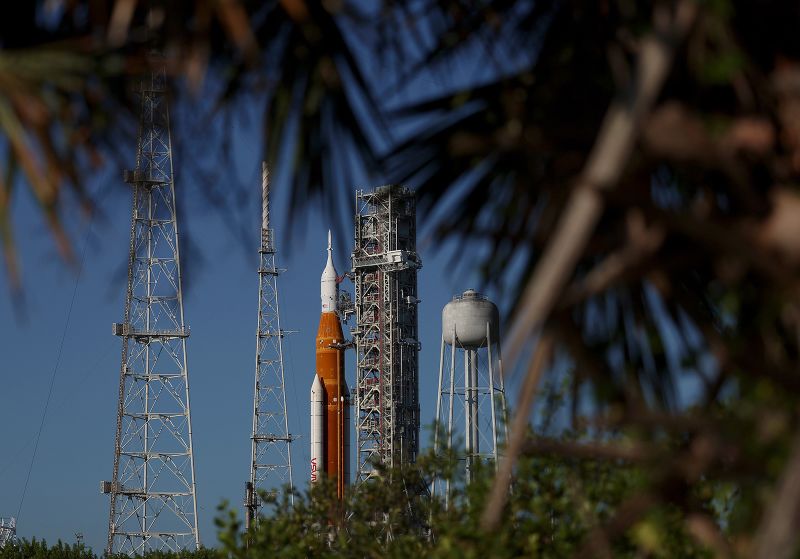How important is the Artemis I mission launch?
1:07
(CNN Business) --
NASA's new moon rocket hit another snag during the agency's latest attempt to launch an uncrewed test mission, and it will be at least weeks -- rather than days -- before the rocket can make its next attempt.
The delay can be attributed to several factors, including scheduling quirks, potential launch site traffic, and NASA's desire to make sure it has resolved the latest fuel leak issues.
The next launch attempt for Artemis I could take place until the end of this year
Let's recap what happened on Saturday, September 3: Launch officials came confident in attempting to launch the rocket called the Space Launch System, or SLS, this weekend.
But then, as the rocket was being reloaded with supercold liquid hydrogen propellant, a huge leak occurred.
And NASA said Tuesday that it would start trying to fix those problems while the rocket is still on the launch pad.
However, the space agency will have to roll the rocket back to the nearby Vehicle Assembly Building, a trip of about seven km that takes about 10 hours, in order to "reset the system's batteries", according to a publication. from the NASA blog.
And when it comes to setting a new release date, the schedule will be tricky.
advertising
Why are you postponing the launch of Artemis I?
0:31
Timing
can
be everything
On any given day, there are specific time slots—or "launch windows"—when the rocket can be launched, which can range from half an hour to several hours a day.
But even those windows are not available every day.
There are also "launch periods," which are periods of days when the Moon aligns with the Earth in a favorable way for this mission.
The latest launch period ended on Tuesday, September 6, and NASA had said there was no way the SLS would be ready to fly at that point.
The next release period is from September 19 to October 4.
But there's another potential problem: NASA is scheduled to launch its Crew-5 mission, which will carry a new crew of astronauts to the International Space Station aboard a SpaceX rocket, on October 3.
And NASA will have to work to make sure one launch doesn't conflict with another.
Later in October, another launch period will begin, from 17 to 31. This period will offer 11 possible launch windows for the SLS.
(No release times available on October 24, 25, 26, and 28.)
The period and window that NASA targets will depend on a number of factors, including coordination with SpaceX regarding the Crew-5 launch and how long the SLS rocket remains on the launch pad while engineers work out. the leak problem, according to Jim Free, NASA associate administrator for exploration systems development.
super cold fuel
When the SLS rocket fills up with fuel, it needs gigantic amounts of supercold liquid oxygen and liquid hydrogen to be pumped into the rocket's tanks.
When charging hydrogen, the fuel begins to pump slowly, but then increases its speed in what is called a "fast fill".
And it was during that rapid fill that a "big leak" occurred, larger even than the leaks NASA identified during the August 29 launch attempt.
Because of this, the releasers want to make sure that a solution and root cause have been found before making the next attempt.
Until Saturday, one of the guesses was that a problem with a valve could have caused the hydrogen to become over-pressurized.
Until Saturday, NASA had also been trying to fix several problems it encountered during the first attempt to launch the SLS rocket on August 29.
It addressed some leaks that occurred during fueling and assessed the risks of a problem with the engine's cooling system and a crack in the foam lining one of the rocket's tanks.
NASA may decide to re-examine these issues on its next launch attempt.
Precarious weather in Florida further complicates the selection of the next launch date.
For any rocket launch, high winds, lightning or other unfavorable conditions can force further delays.
Late summer and early fall can also bring hurricanes to the Florida coast, where the SLS is located.
NASA is studying the possibilities, and the public can expect more answers in the coming days and weeks.
What went wrong before the launch of Artemis I?
2:56
This is rocket science
As NASA officials have already said, they hope to convey that these delays and technical problems do not necessarily point to a major problem with the rocket.
Before SLS, NASA's Space Shuttle program, which flew for 20 years, had frequent launch interruptions.
SpaceX's Falcon rockets also have a history of launches being interrupted by mechanical or technical problems.
After all, this is rocket science.
"I can tell you these teams know exactly what they're doing, and I'm very proud of them," NASA Administrator Bill Nelson said Saturday.
"We tried to emphasize that this is a test and that a test has some risk, and we stressed that in all the public comments that we made so that expectations were adjusted to reality."
Free, the NASA associate administrator, added that his team will always go for an optimistic launch attempt that liftoff will occur.
"I'm sure there will be a question: 'Are we safe?'" he said.
"I actually love that question because it's like (asking): 'Were you sure you were going to get out of bed this morning?'"
This mission, called Artemis I, is expected to pave the way for many more missions to the Moon.
The Artemis II mission, scheduled for next year, will follow a similar flight path around the Moon, but with a crew on board.
And later this decade, Artemis III is expected to land astronauts on the lunar surface for the first time since NASA's Apollo program in the mid-20th century.
CNN's Ashley Strickland contributed to this article.

